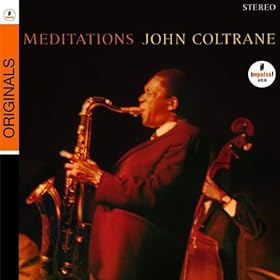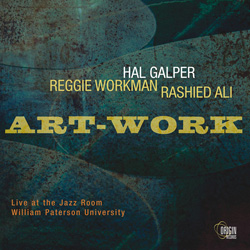Home » Jazz Articles » Multiple Reviews » Rashied Ali: Meditations, Live in Europe and Art-Work
Rashied Ali: Meditations, Live in Europe and Art-Work
 |  |  |
John Coltrane Meditations Impulse! 2009 | Rashied Ali Live in Europe Survival Records 2009 | Hal Galper Art-Work Origin Records 2009 |
The eight years John Coltrane spent as a leader before his truly untimely death have been parsed and evaluated endlessly, with such vague qualities as importance, significance and influence repeatedly shuffled and distributed like playing cards. Another label tossed around is underappreciated, which is at least as difficult a thing to measure.
But one record does stand out as a fascinating—and yes, underappreciated—document in Traneology and if the keepers of the jazz canon don't always recognize the keys Meditations holds, musicians seem to: Rashied Ali and David Liebman have both covered the album in its entirety. Just as The Complete 1961 Village Vanguard Recordings boxed set can be seen as a blueprint for Coltrane's "classic quartet," Meditations can be read as an outline for the remarkable advances of the final two, unbelievably prolific, years of his life.
Like A Love Supreme, almost universally regarded as his greatest work, Meditations (recorded in two versions the following year) is an album-length suite deeply rooted in Coltrane's spiritual beliefs; as the title suggests, this is transcendent music. Coltrane first recorded it in September of 1965 with his standing quartet of McCoy Tyner, Jimmy Garrison and Elvin Jones in a version that wouldn't be heard until 1977 and then returned to the studio two months later with the quartet augmented by Rashied Ali on drums and Pharoah Sanders on sax. The second session upped the energy considerably and there's a palpable tension between the quartet and the thunder of the new players, with the leader right in the middle. It would be the last studio session Tyner and Jones would do with Coltrane and so truly marks a turning point, documenting Coltrane's transition to free improvisation and the influence that such younger players as Albert Ayler and Archie Shepp were having over him.
But the significance is not all historical. If it's not one of Coltrane's greatest offerings, it still goes without saying that it's deserving of the current reissue (although there's no new mastering or added tracks since the last CD issue to sell it). While the first two pieces do sound like nascent attempts at what he would later achieve, "Love" stands out as one of his more memorable compositions, opening with a lyrical three-minute bass solo before Coltrane introduces a leapfrogging theme similar in approach to the earlier "One Up, One Down" or "Giant Steps" but with a new impetus in execution and a cascade coming from the two drummers behind him. When it flows into "Consequences" and Sanders joins on second sax, it is truly jubilant. The brief "Serenity" that closes the album hints at the approach to modality that he would realize on Expression, truly an underacknowledged album in Coltrane's discography.
Four decades later, Rashied Ali soldiers on along the path Trane set and Live in Europe (recorded at the Jazz Happening festival in Tampere, Finland) is a surprising step on the journey. Close to 60 of its 70 minutes are given to James "Blood" Ulmer compositions, which is a hard thing to imagine given that there's no guitar in the band. The 26-minute "Theme From Captain Black" (called "Theme for" here) opens the set, reimagining Ulmer's three-minute groove (recorded in 1978 with Ornette and Denardo Coleman atop Jamaaladeen Tacuma's electric bass) for a traditional quintet lineup. Ulmer's funky theme isn't quickly recognizable here, but it's energetically played, particularly by Ali and bassist Joris Teepe, who leaps out across the set. After a shorter piece by saxophonist Lawrence Clark, they close with Ulmer's "Thing for Joe," written for Joe Henderson.
Whatever the project, Ali is not one to fade into the background and that energy level is what makes the Hal Galper trio record Art-Work so odd. Galper is a muscular player as well and their opening take on Ellington's "Take the Coltrane" is played with surprising velocity. Galper doesn't quite pound the piano but plays with a strength that works well with Ali's percussion. It's easy to imagine them playing a furious free improv session, but the set list was mostly standards when they recorded at William Paterson University in New Jersey. The group eases off to interpret Miles Davis and Charlie Parker, giving bassist Reggie Workman more room to be heard. Galper's two ballads are left for the end but contain the most finesse on the album.
Tracks and Personnel
Meditations
Tracks: The Father, The Son and the Holy Ghost; Compassion; Love; Consequences; Serenity
Personnel: John Coltrane and Pharaoh Sanders: saxophone; McCoy Tyner: piano; Jimmy Garrison: bass; Elvin Jones and Rashied Ali: drums
Live in Europe
Tracks: Intro; Theme for Captain Black; Lourana; Thing for Joe
Personnel: Rashied Ali: drums; Josh Evans: trumpet; Lawrence Clark: tenor saxophone; Greg Murphy: piano; Joris Teepe: bass
Art-Work
Tracks:
Personnel: Hal Galper: piano; Reggie Workman: bass; Rashied Ali: drums
Live in Europe
Tracks: Take the Coltrane; Soul Bod; Blue in Green; Constellation; Stella by Starlight; Soliloquy; When Autumn Leaves Us
Personnel: Rashied Ali: drums; Josh Evans: trumpet; Lawrence Clark: tenor saxophone; Greg Murphy: piano; Joris Teepe: bass
Comments
Tags
For the Love of Jazz
 All About Jazz has been a pillar of jazz since 1995, championing it as an art form and, more importantly, supporting the musicians who create it. Our enduring commitment has made "AAJ" one of the most culturally important websites of its kind, read by hundreds of thousands of fans, musicians and industry figures every month.
All About Jazz has been a pillar of jazz since 1995, championing it as an art form and, more importantly, supporting the musicians who create it. Our enduring commitment has made "AAJ" one of the most culturally important websites of its kind, read by hundreds of thousands of fans, musicians and industry figures every month.



















